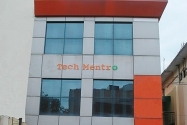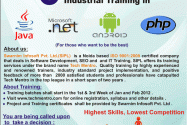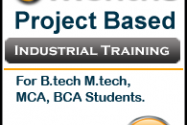![]()

Tech Mentro, Noida
Uttar Pradesh India(IN)201301
: Institute
Write a Review Claim Your Ownership
Tech Mentro is quality oriented Java, J2ee, .Net, Android, PHP, C, C++, Struts, Spring and Hibernate Training Institute of Noida, NCR, India. It is managed by a team of highly talented professionals who have more than 30 years of combined I.T. and Corporate Training experience. The mission of Tech Mentro is to make engineering graduates and professionals employable so that they can have blooming careers.
Java, J2ee, .Net, Android, PHP, C, C++, Struts, Spring and Hibernate are technologies that are used in the development of applications of different domains. Any technology can be applied only if it is learned conceptually i.e. a learner knows what it is, how it should or should not be used, what advantages it provide, where it can be applied etc. Applied and Conceptual Training is the USP of Tech Mentro.
The goal of Tech Mentro is to be the numero uno in India in the domain of high end Training in the years to come. To achieve our goal we have charted a path for ourselves, main elements of which are our students and professionals who shall move us to the top. The success that we have achieved so far is the indicator that we are moving swiftly towards our goal.
Course Details
Course Syllabus
Introduction to Java (6 Hrs)
OOPs Implementation (30 hrs)
Exception Handling 6 hrs
MultiThreading in Java 10 hrs
Input Output Streams 8 hrs
Networking 6 hrs
Reflection 4 hrs
Collection Framework 16 hrs
I18n or Internationalization 4 hrs
Using ResourceBundle and properties files for internationalizing textual contents.
Database Connectivity Using JDBC 4.x 10 hrs
Other Information
Course Fee: Not Mentioned
Course Duration: Not Mentioned
Placement Provided: No
No Comments Posted
- Teras Consulting, Noida
- Arione Consulting Pvt. Ltd., Noida
- HCL CDC Learning Center, Noida
- Multisoft Systems, Noida
- Tech Mentro, Noida
- High Technologies Solutions, Noida
- JKT Academy, Noida
- Ducat India - Dot Net Training & IT Training Institute, Noida
- Metro Mentors, Noida
- Multisofy Systems, Noida
- Centre For Development Of Advanced Computing CDAC, Noida
- Rector IT Consulting , Noida
- Aptron Solutions, Noida
- Aurelius Corporate Solutions Pvt Ltd., Noida
- vipra Business, Noida
- Techavera Solutions Pvt Ltd, Noida
- Future Labs Technology, Noida
- Cetpa Infotech Pvt. Ltd, Noida
- Croma Campus, Noida
- Tech Altum, Noida
- AIM-IT - IT Training Institute Noida (Institute), Noida



